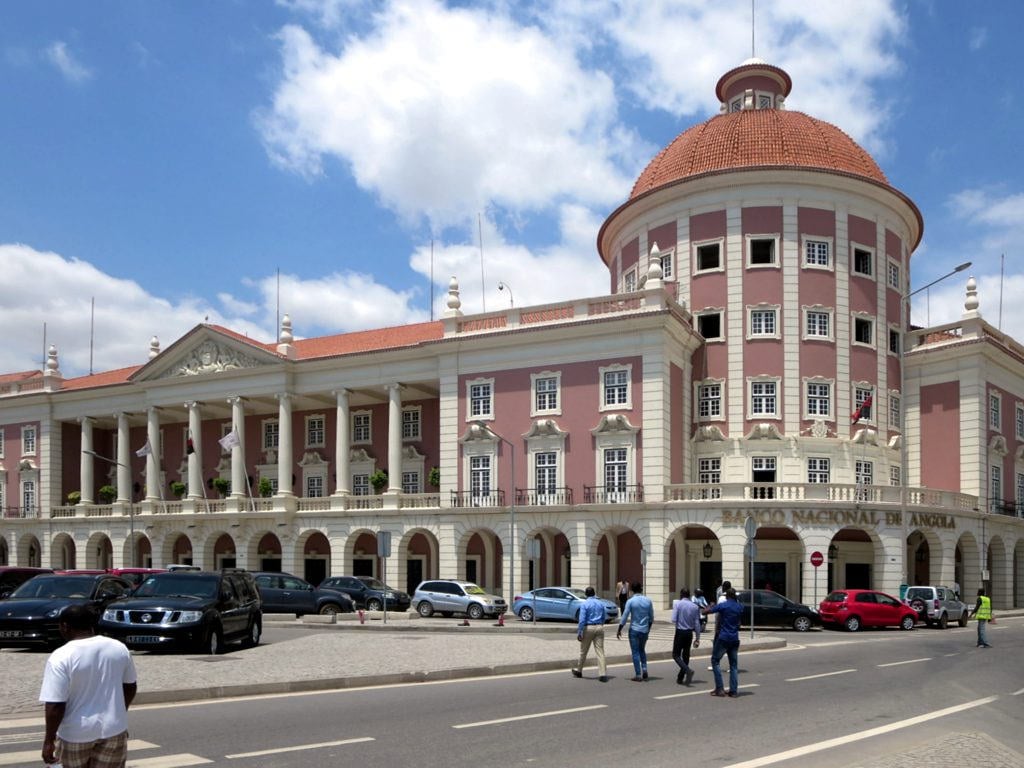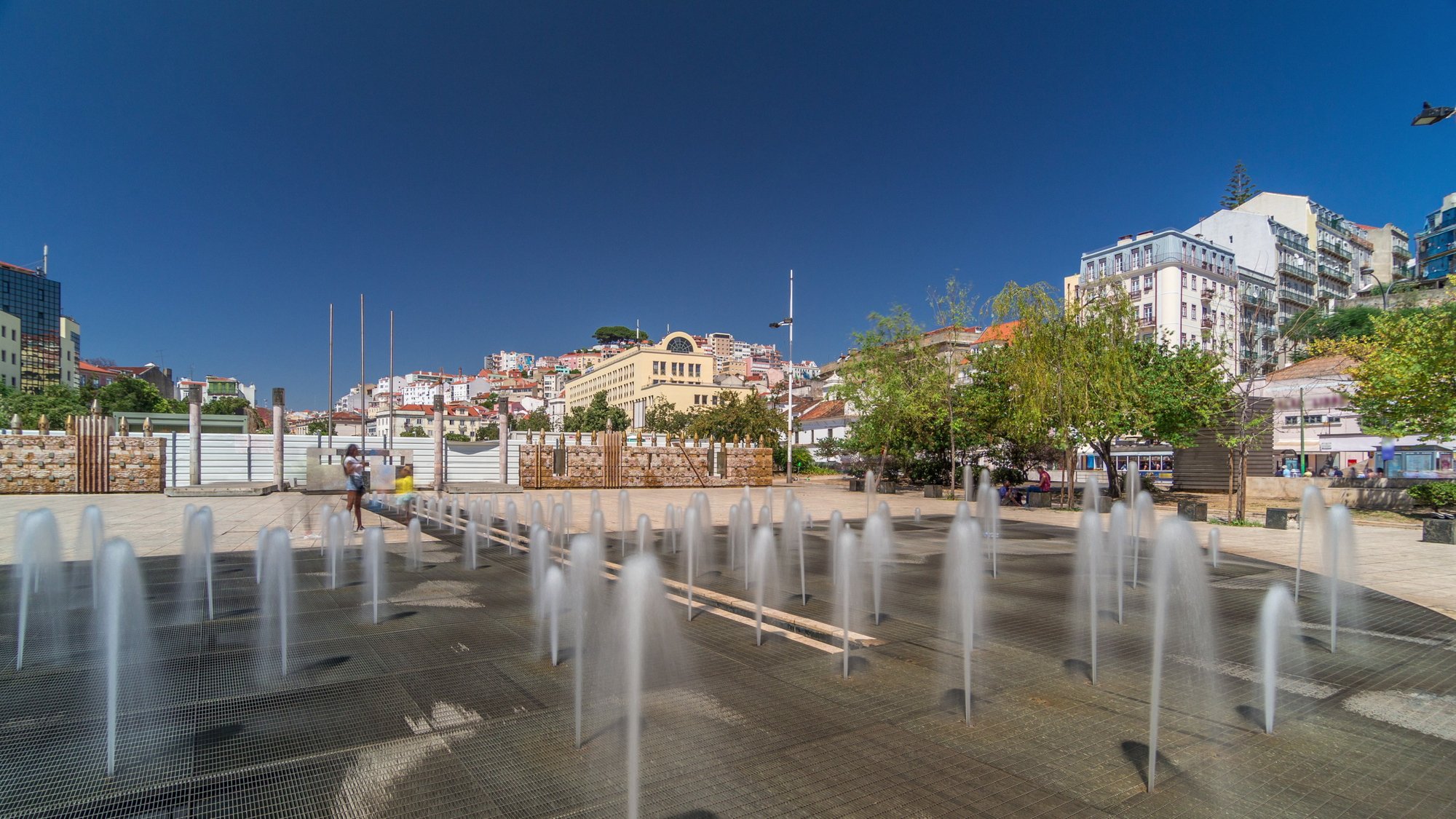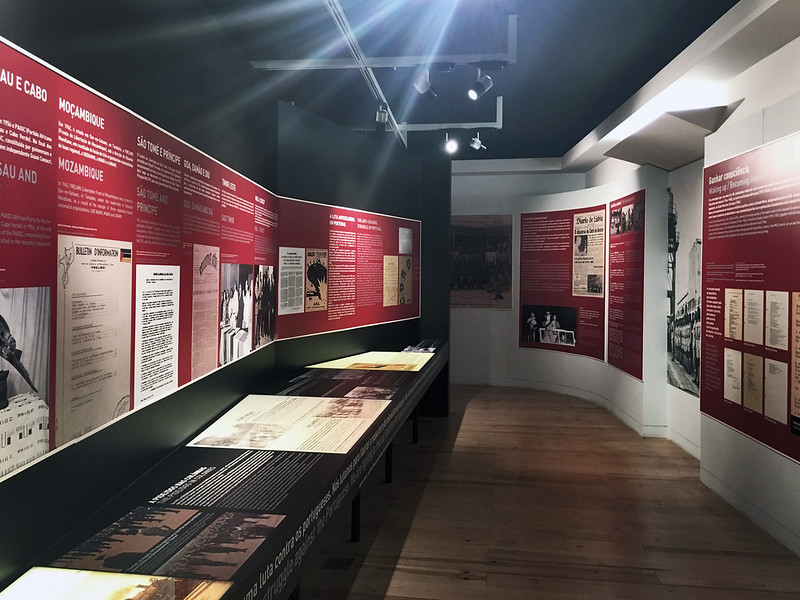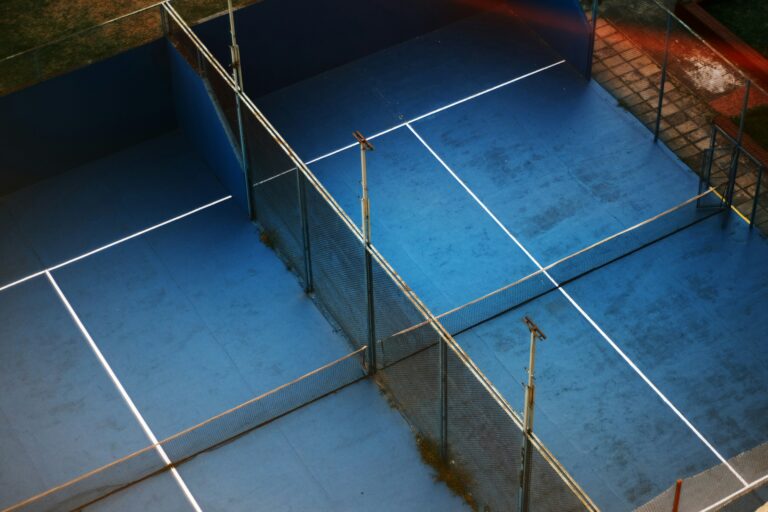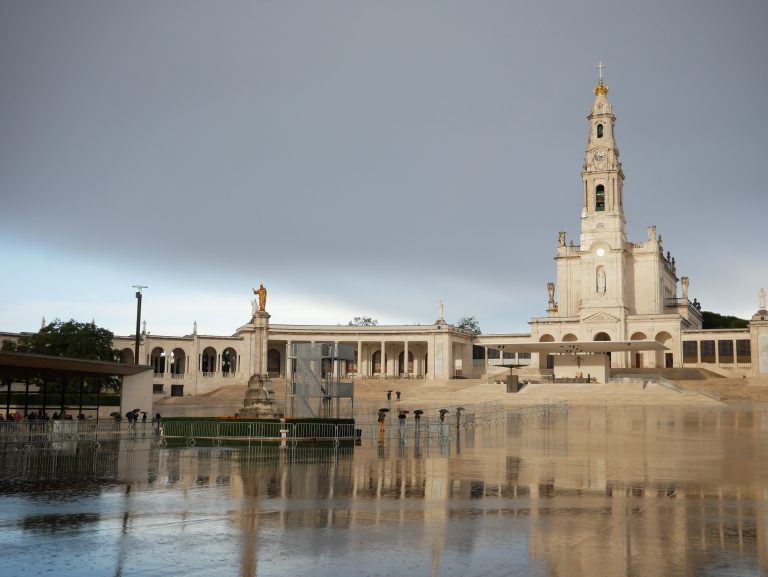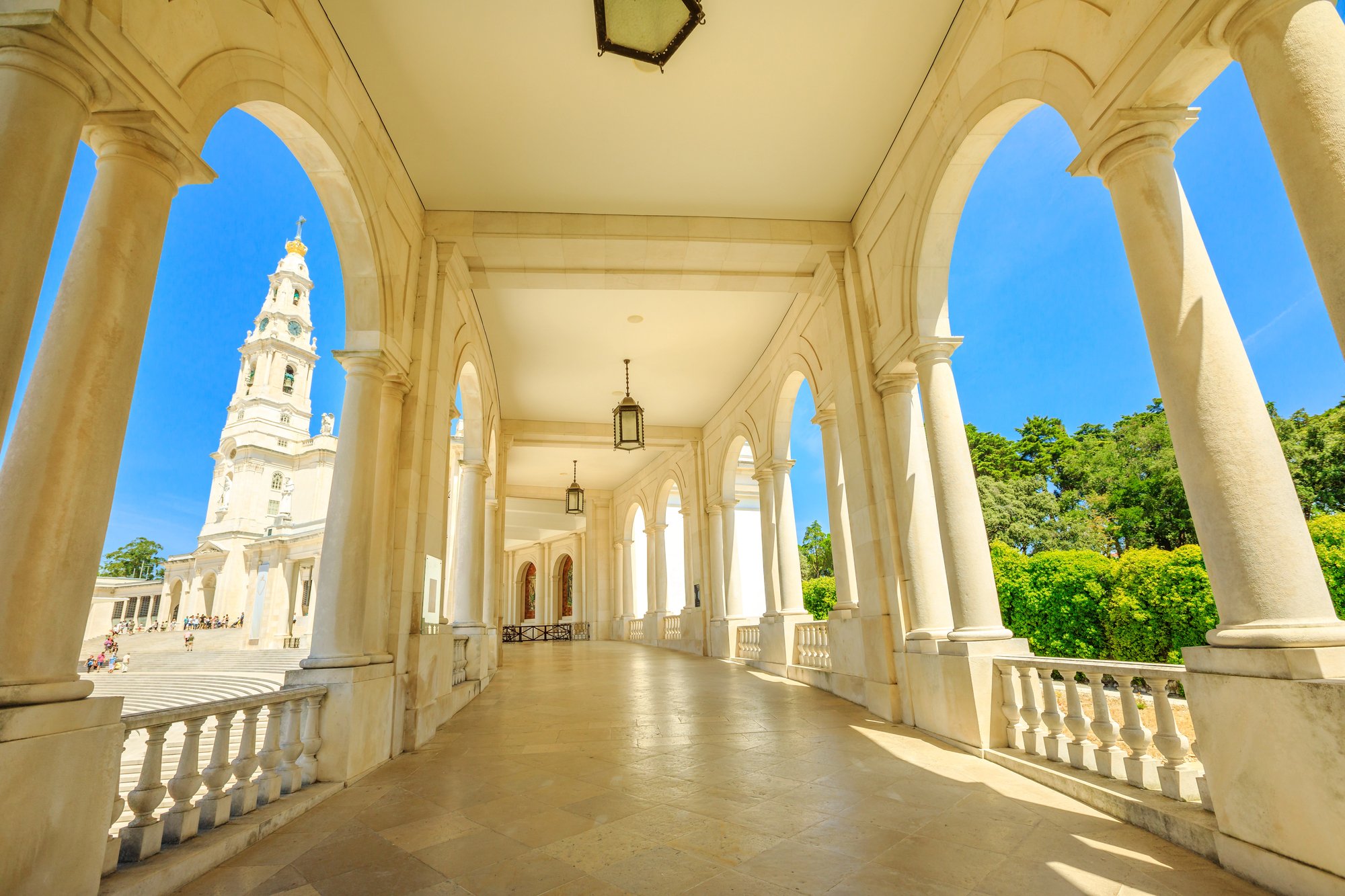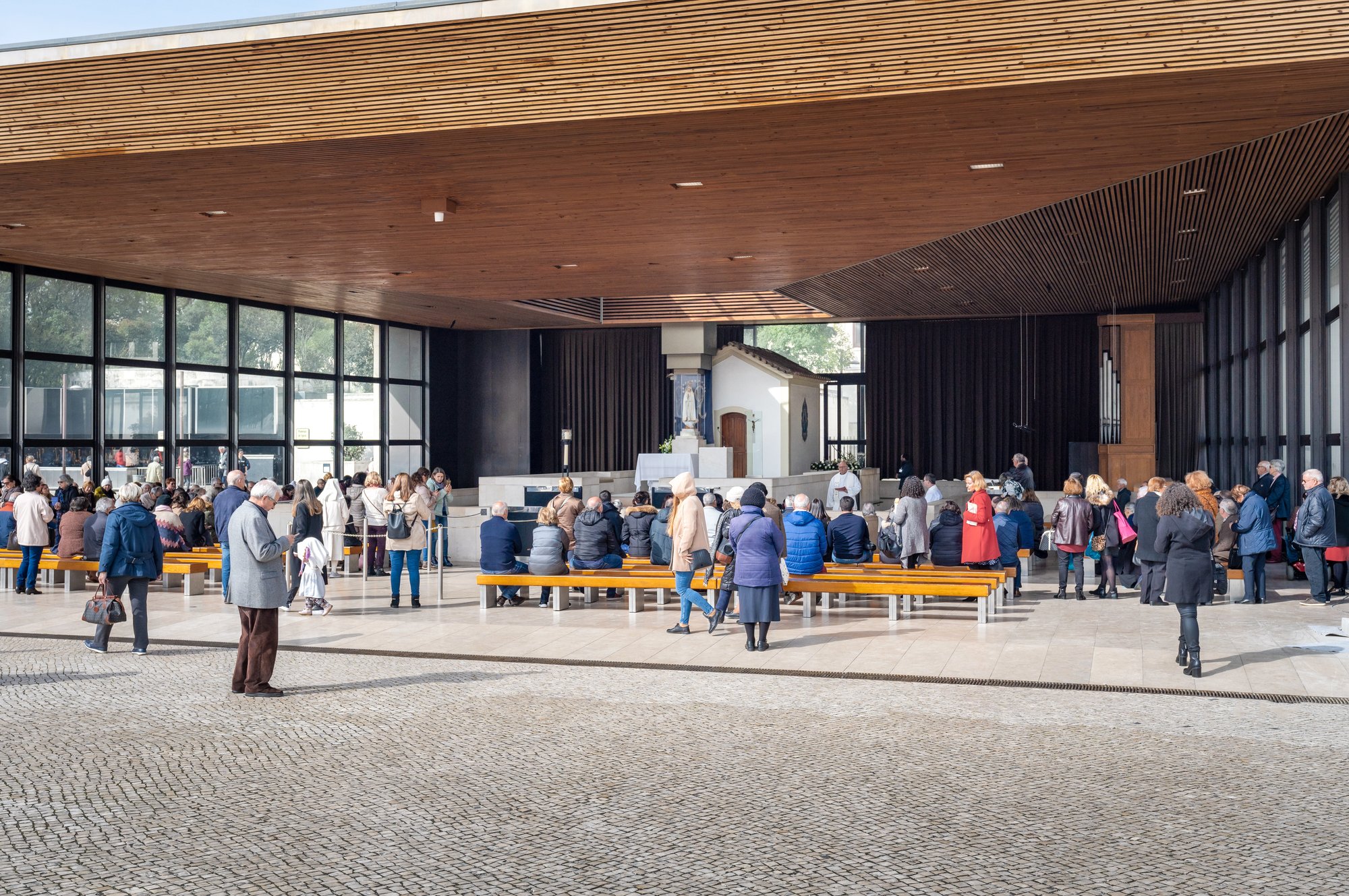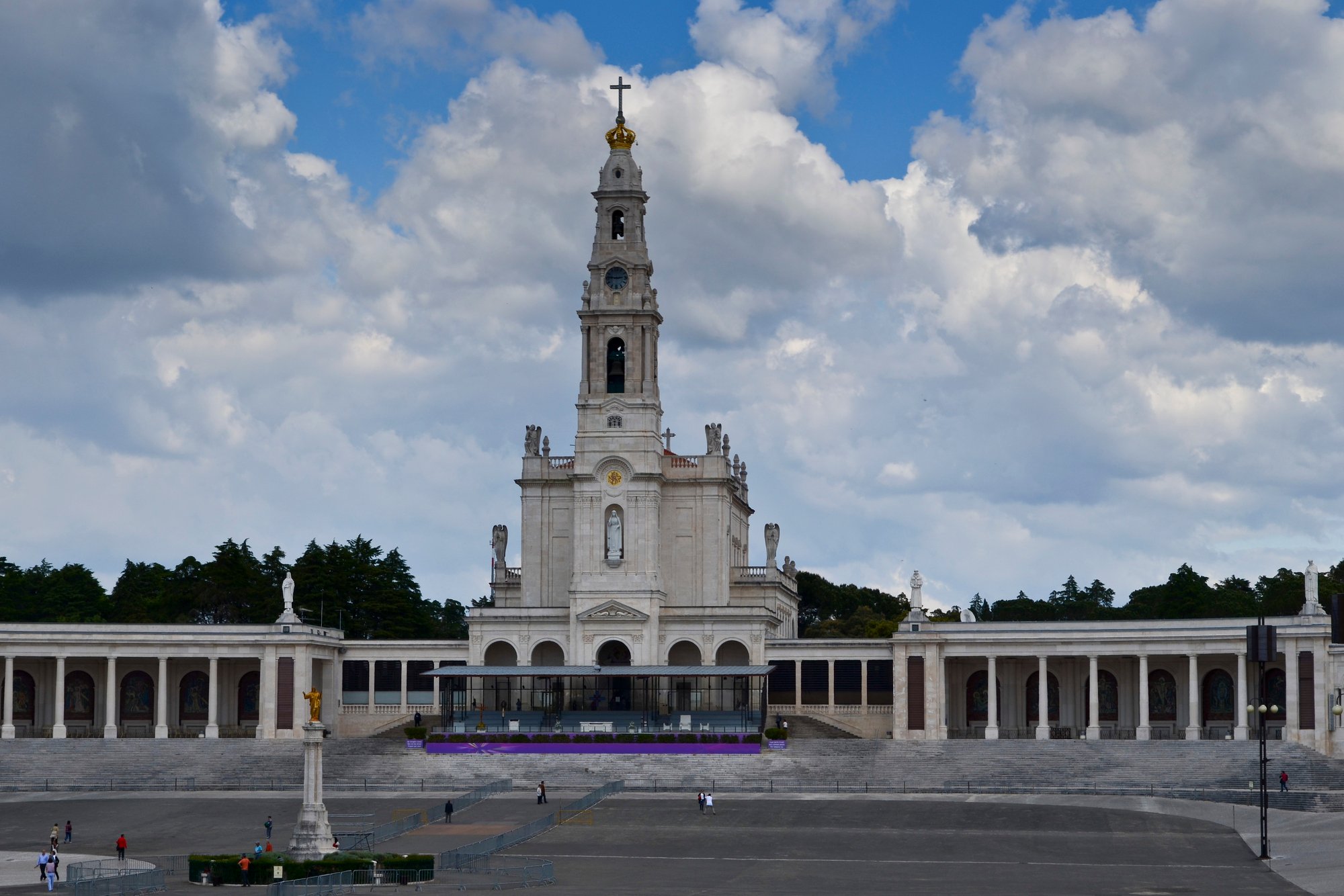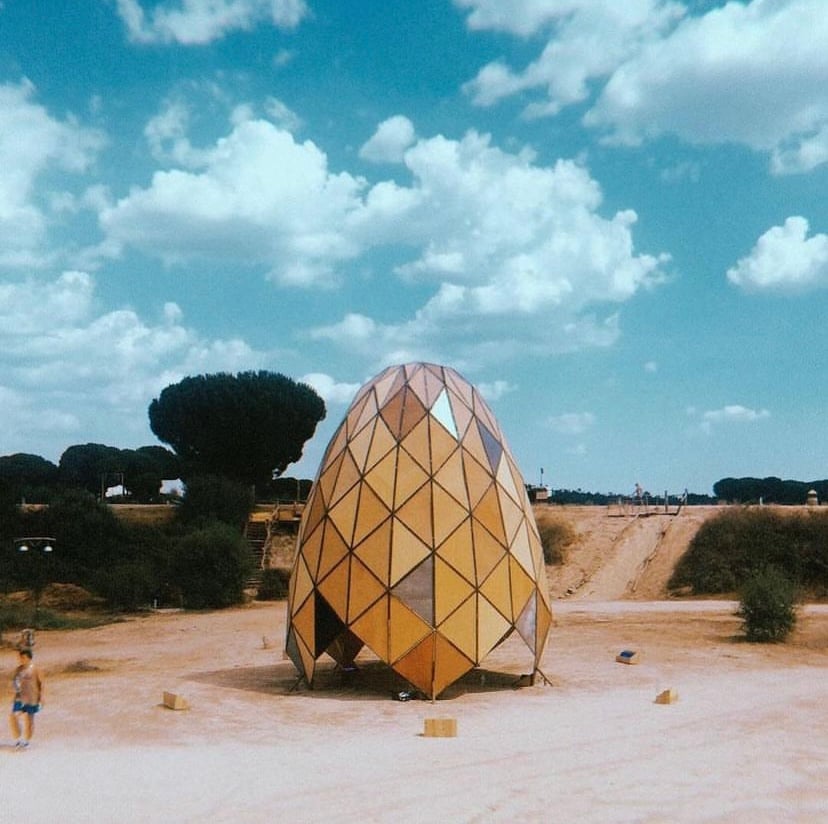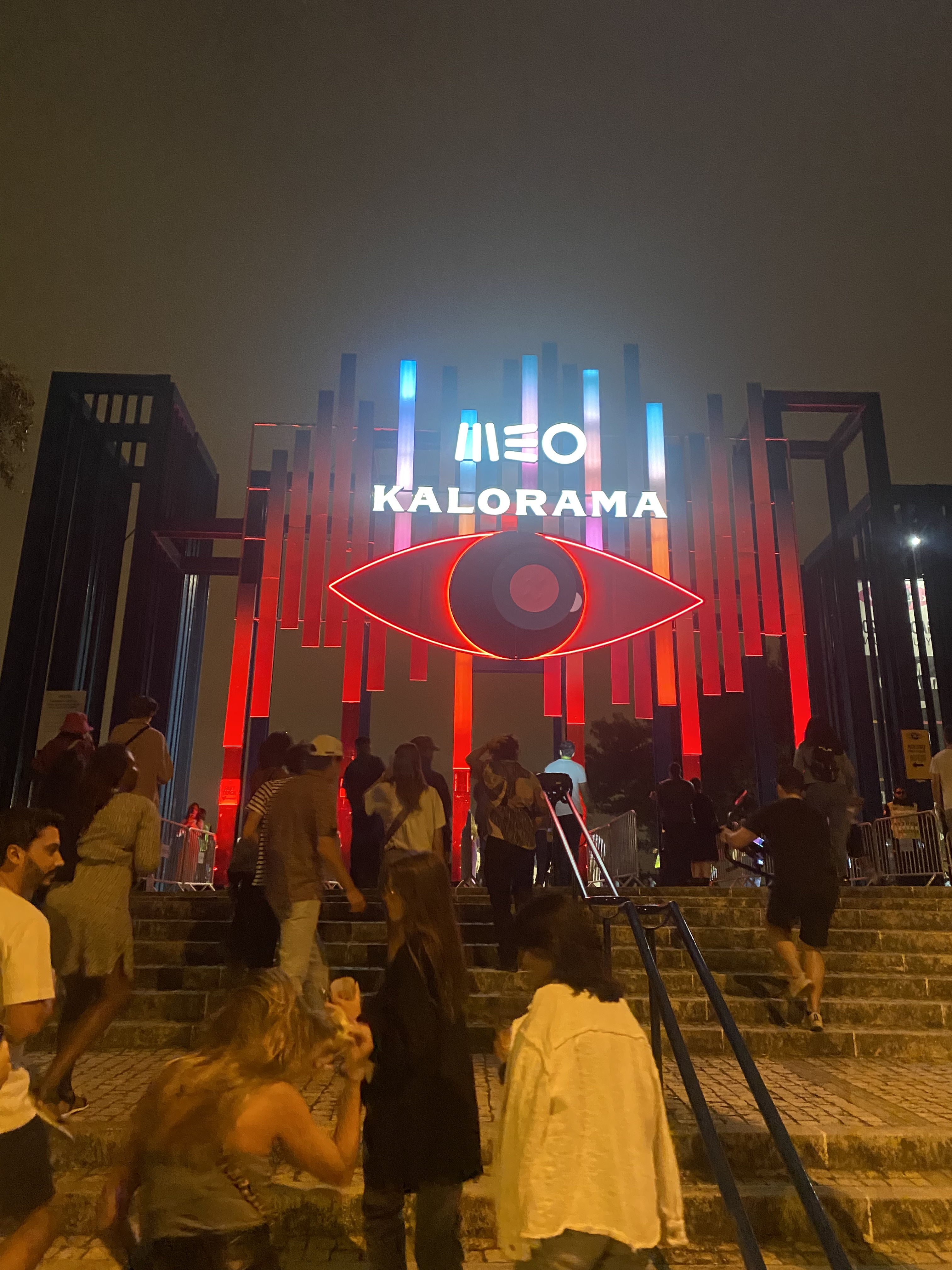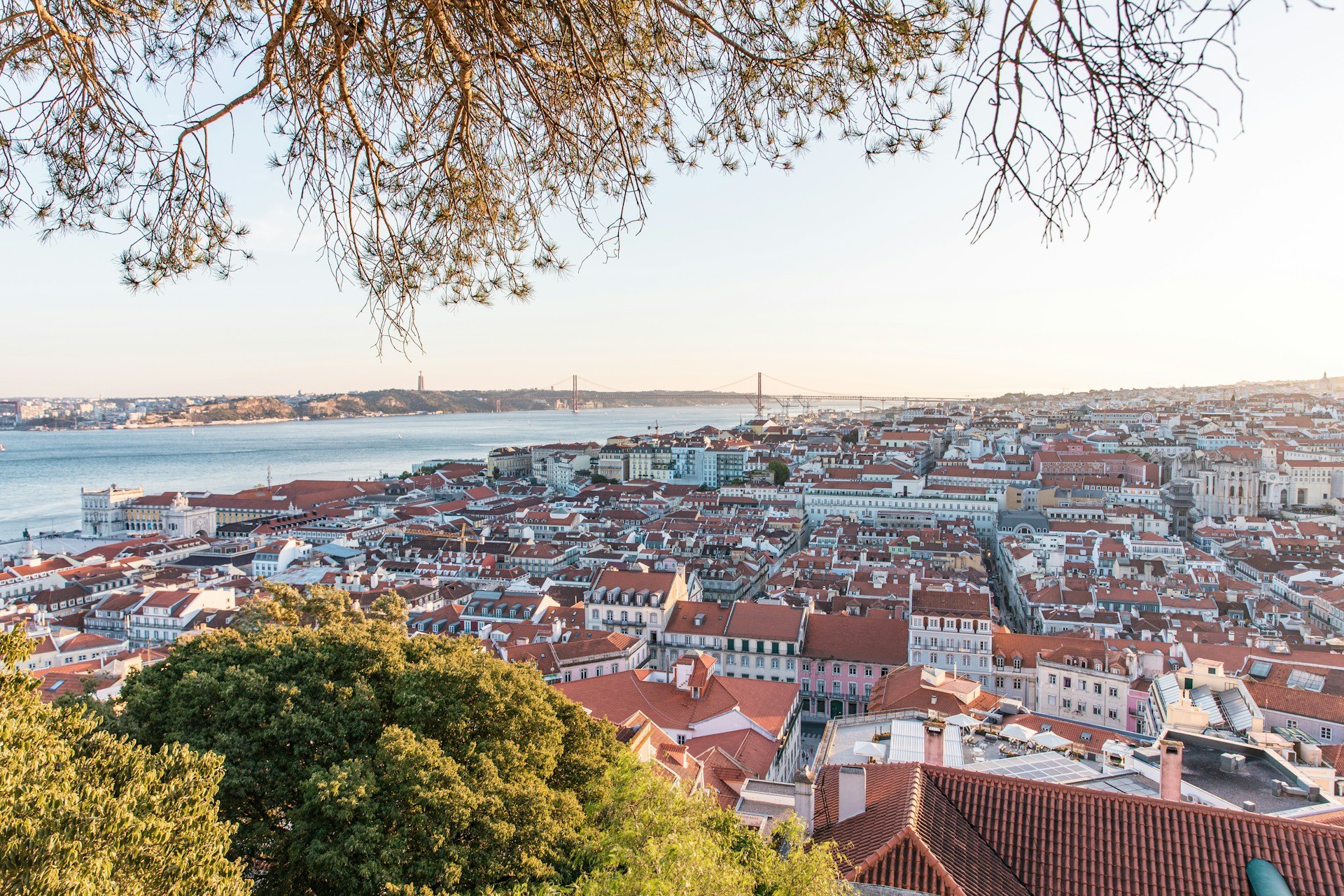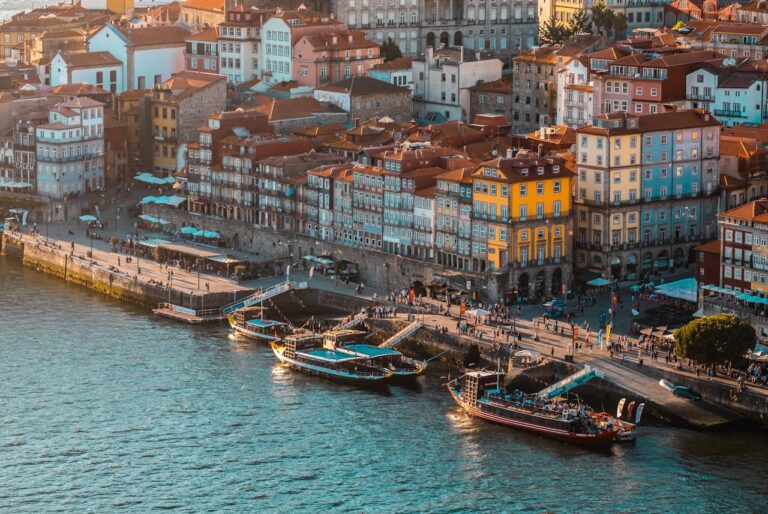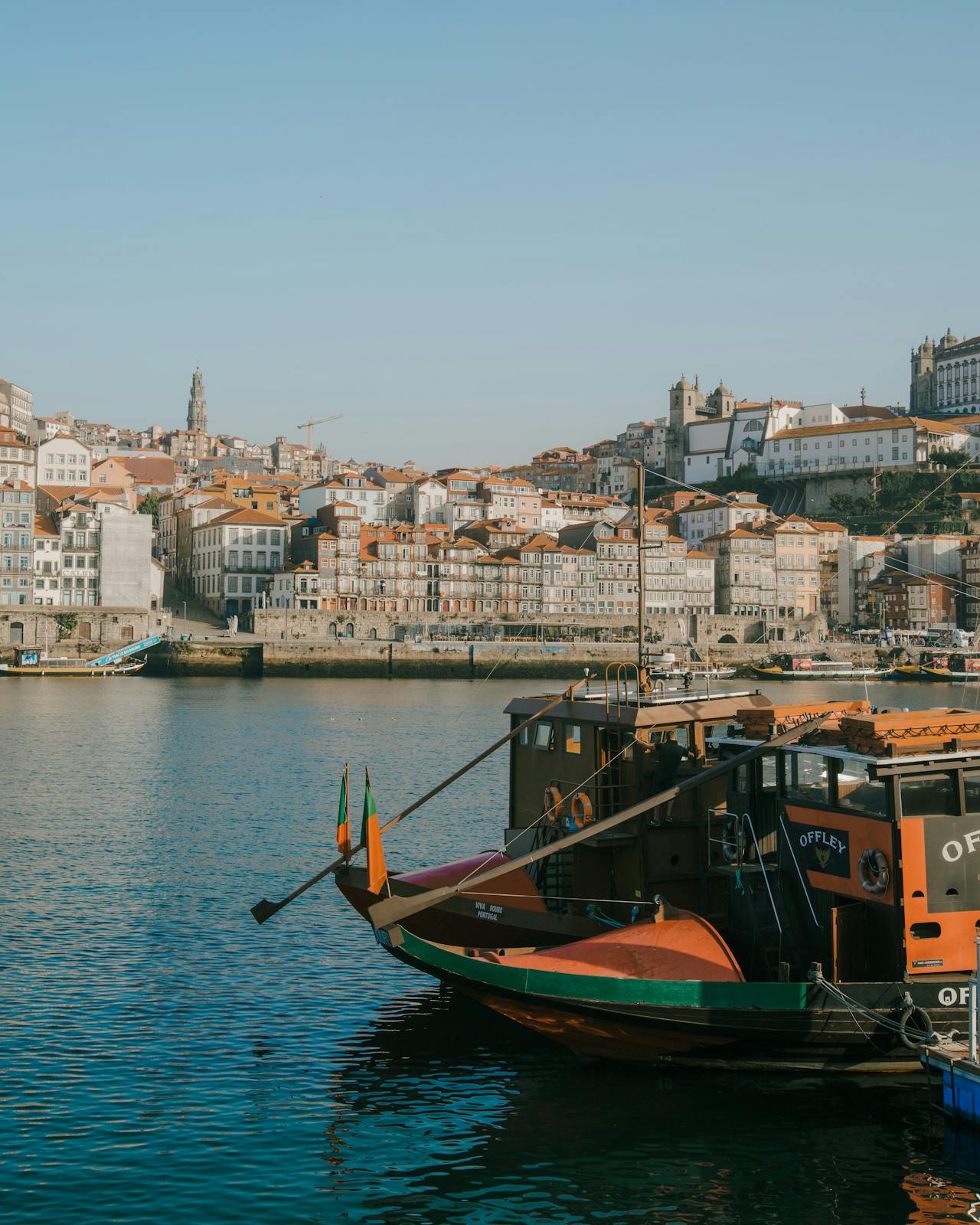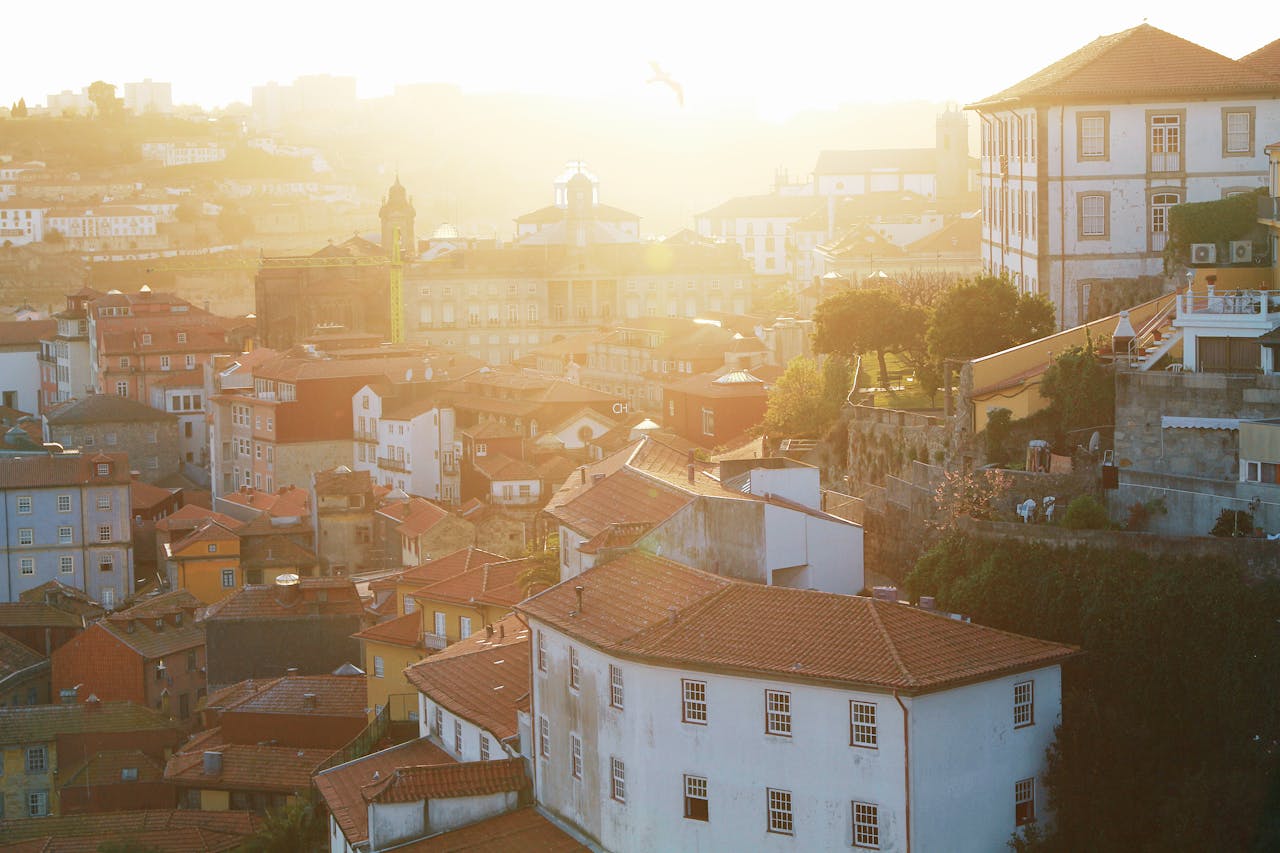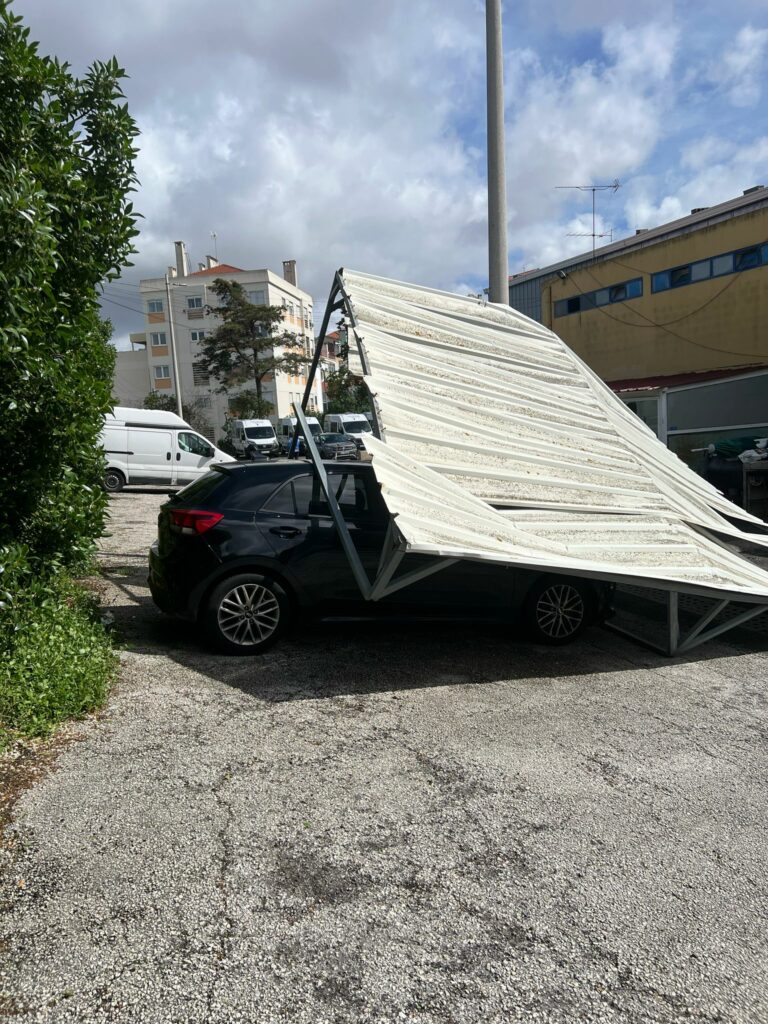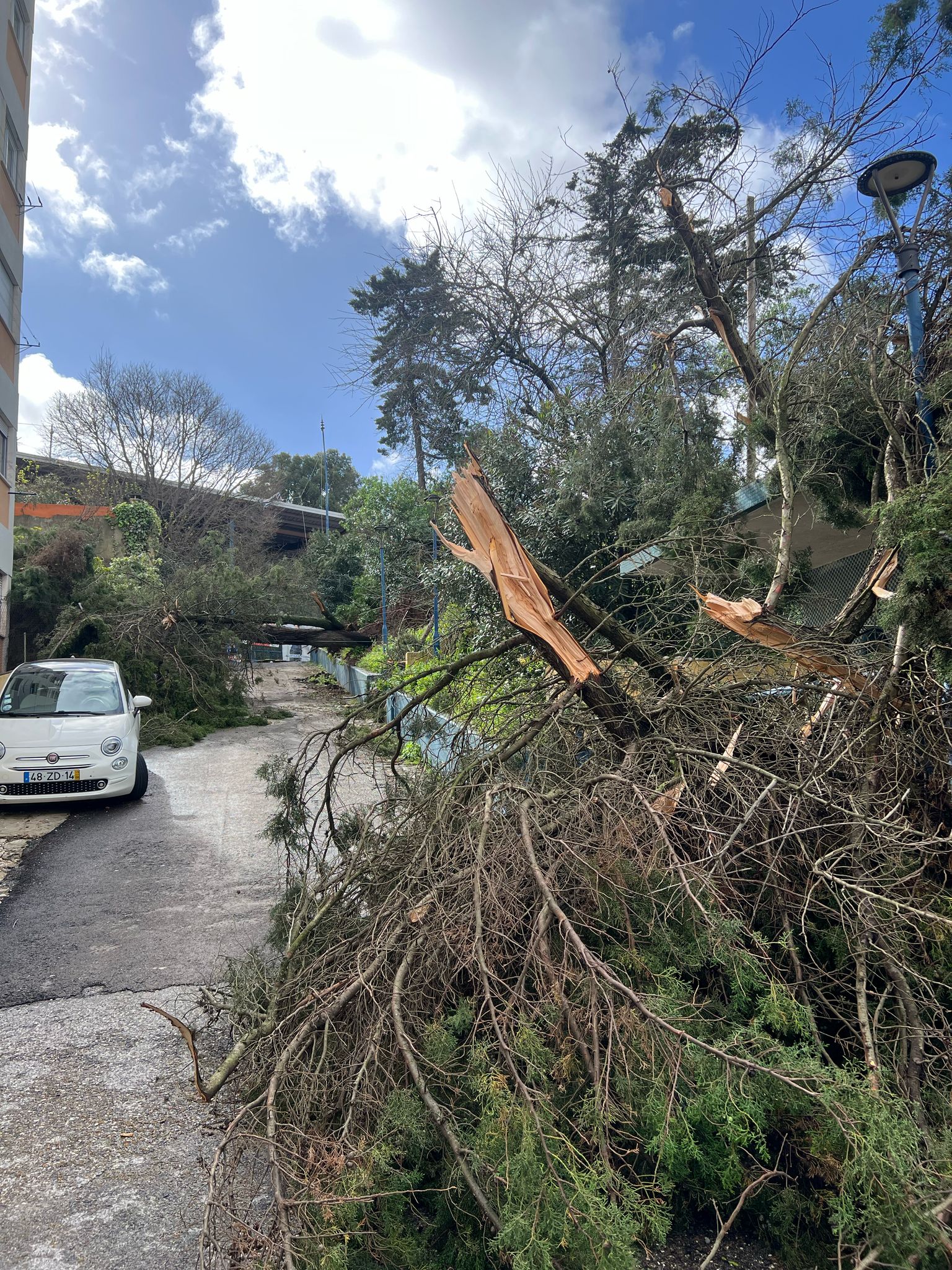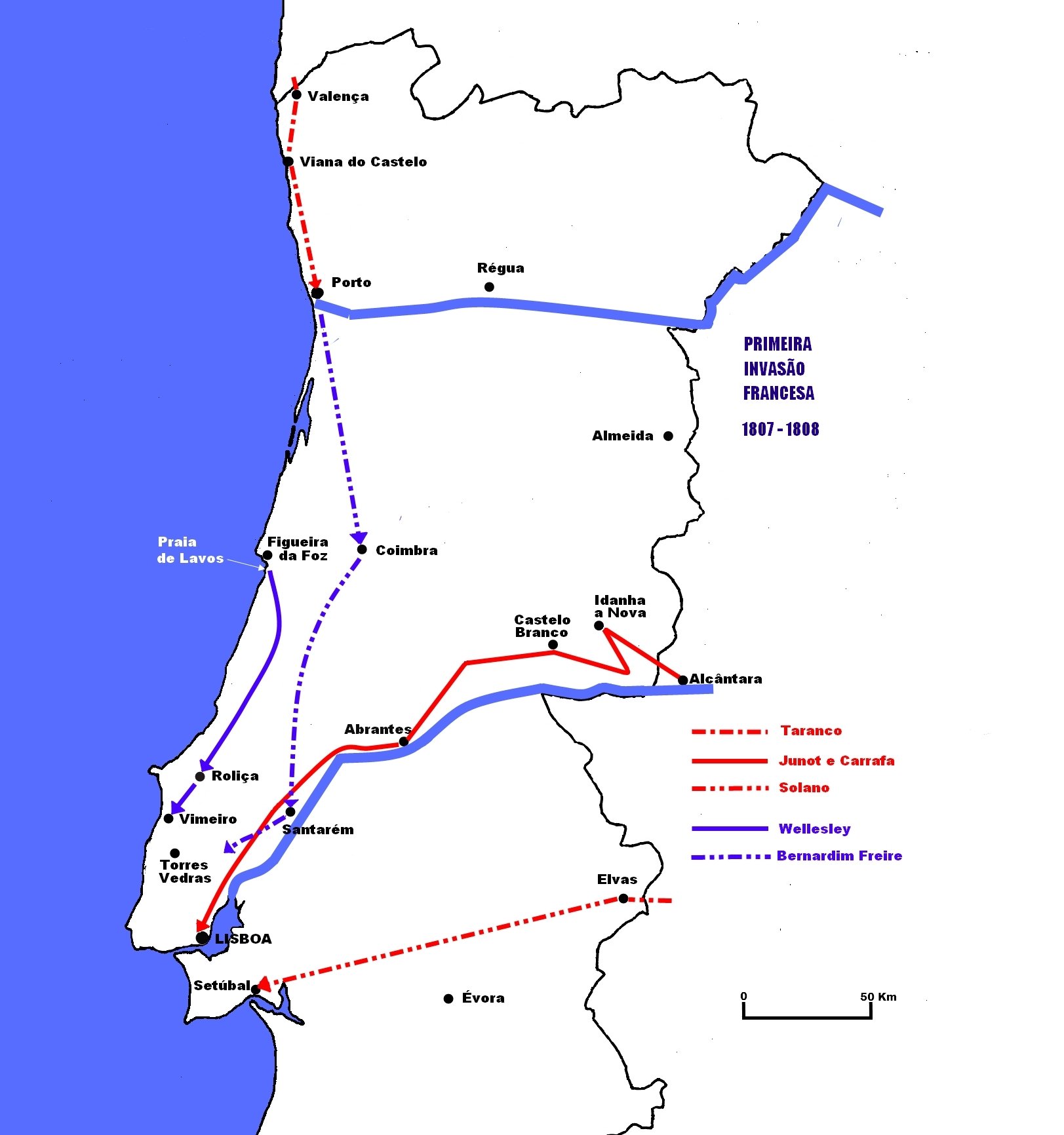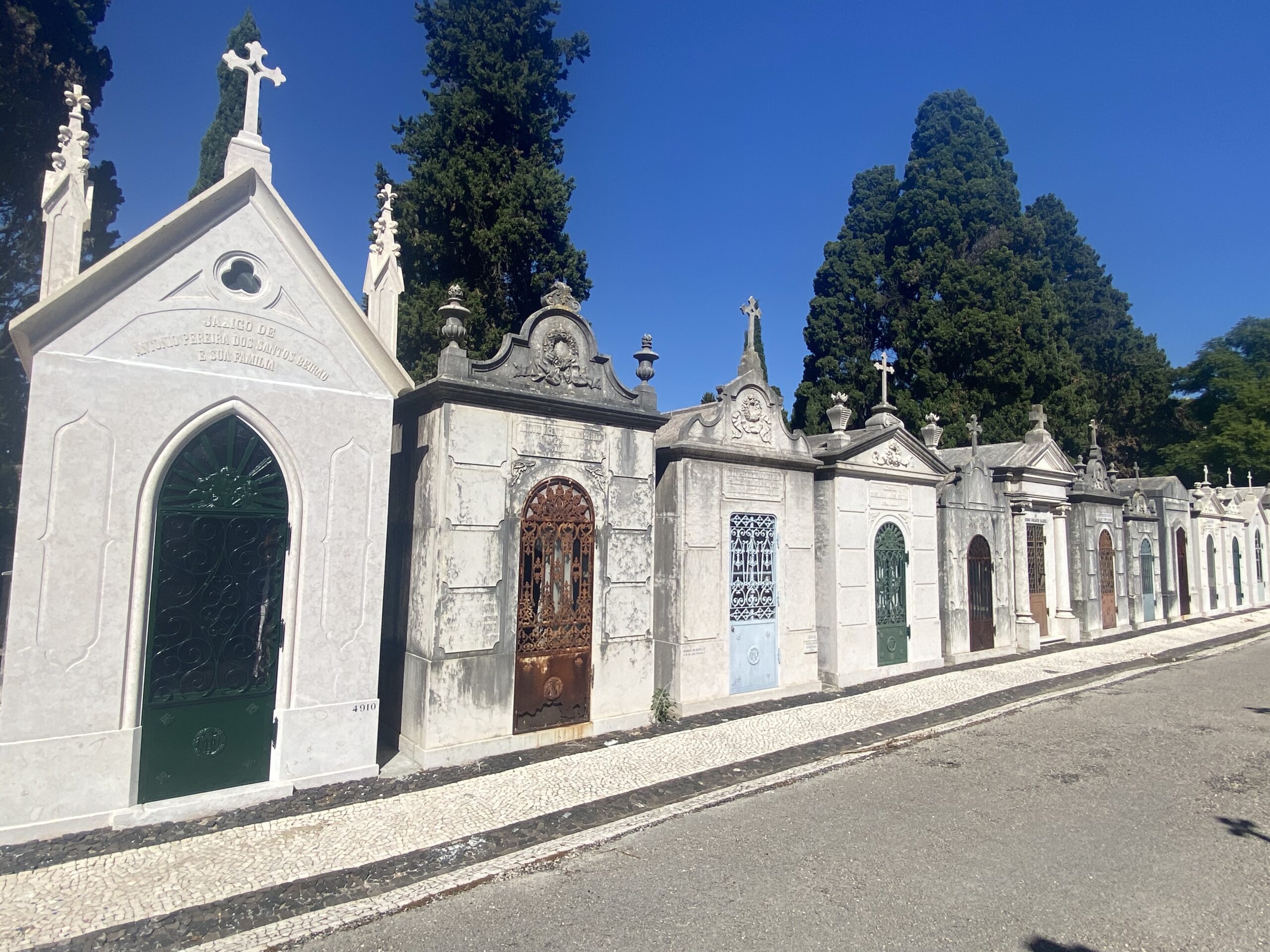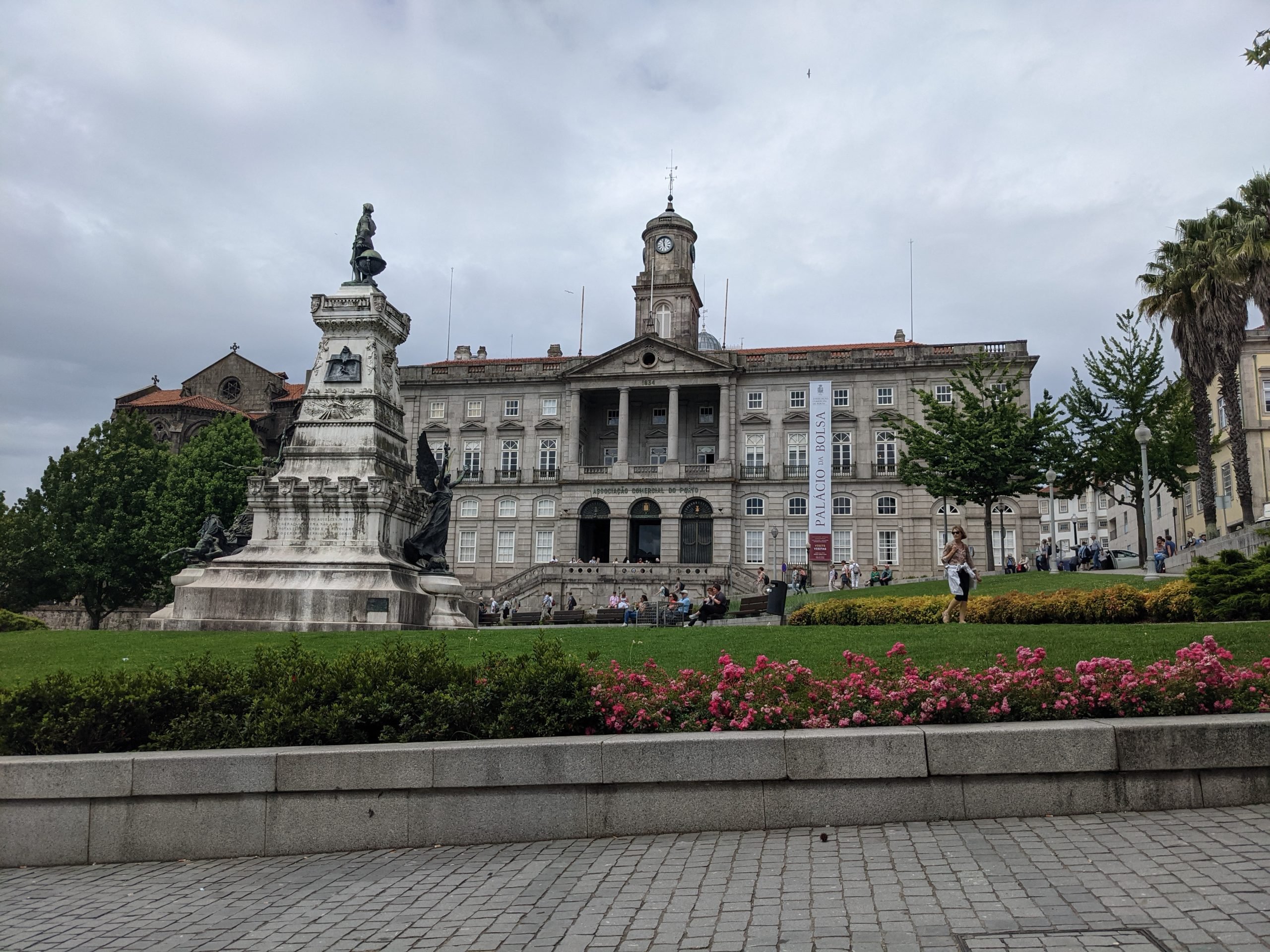In late spring, Lisbon transforms into a purple paradise as jacaranda trees burst into bloom across the city. Much like the cherry blossoms in Tokyo, these magnificent trees, with their vibrant purple-blue flowers, have become synonymous with Lisbon and are celebrated as one of its most beloved natural attractions. Though not native to Portugal, jacarandas have been thoroughly embraced by Lisboetas and visitors, which creates a gorgeous “purple rain” as the petals start to fall. Let’s explore the fascinating history of how this luminous lavender color came to grace Lisbon’s streets, when to best experience their blooming season, and the most spectacular locations to witness their purple canopies throughout the city.
Origins and Introduction to Lisbon
The Jacaranda’s Native Roots
The jacaranda tree (Jacaranda mimosifolia) is native to South America with a great concentration in the northwestern regions of Argentina and Bolivia. These deciduous trees belong to the Bignoniaceae family and are known for their fern-like foliage and trumpet-shaped purple flowers. In their native habitat, jacarandas can grow up to 15 meters tall, with an expansive canopy that creates a stunning display when in full bloom.
Portugal’s Colonial Connections
Like many non-native species that now flourish in European countries, the jacaranda’s journey to Lisbon is closely tied to Portugal’s colonial history. During the Age of Discovery, Portuguese explorers and botanists encountered countless new plant species throughout their colonies and trading posts in Africa, Asia, and South America. This period of botanical exchange, sometimes referred to as the “Columbian Exchange,” saw numerous exotic plants make their way back to the Iberian Peninsula.
The Brazilian Connection
Most historical accounts attribute the introduction of jacaranda trees to Lisbon to Portugal’s deep colonial ties with Brazil. Although the jacaranda is not native to Brazil itself, it had been successfully cultivated there after being introduced from neighboring Argentina. In the 19th century, following Portugal’s extensive colonial presence in Brazil (1500-1822), these trees were brought to Lisbon as botanical specimens, and they were likely first planted in the city’s botanical gardens.
The Liberal Period’s Urban Transformation
The widespread planting of jacarandas in Lisbon’s public spaces began in earnest during the Liberal Period (1820-1910). This era saw significant urban planning initiatives aimed at modernizing Portugal’s capital. The influential figure António Ribeiro, who served as the chief gardener of Lisbon in the late 19th century, is credited with incorporating jacarandas into the city’s landscape design on a large scale.
The major urban renewal projects of the 1870s and 1880s, in particular the development of the Avenida da Liberdade, included extensive tree planting schemes. Jacarandas were selected not only for their beauty but also for their adaptability to Lisbon’s Mediterranean climate, which closely resembles that of their native habitat with hot, dry summers and mild, wet winters.
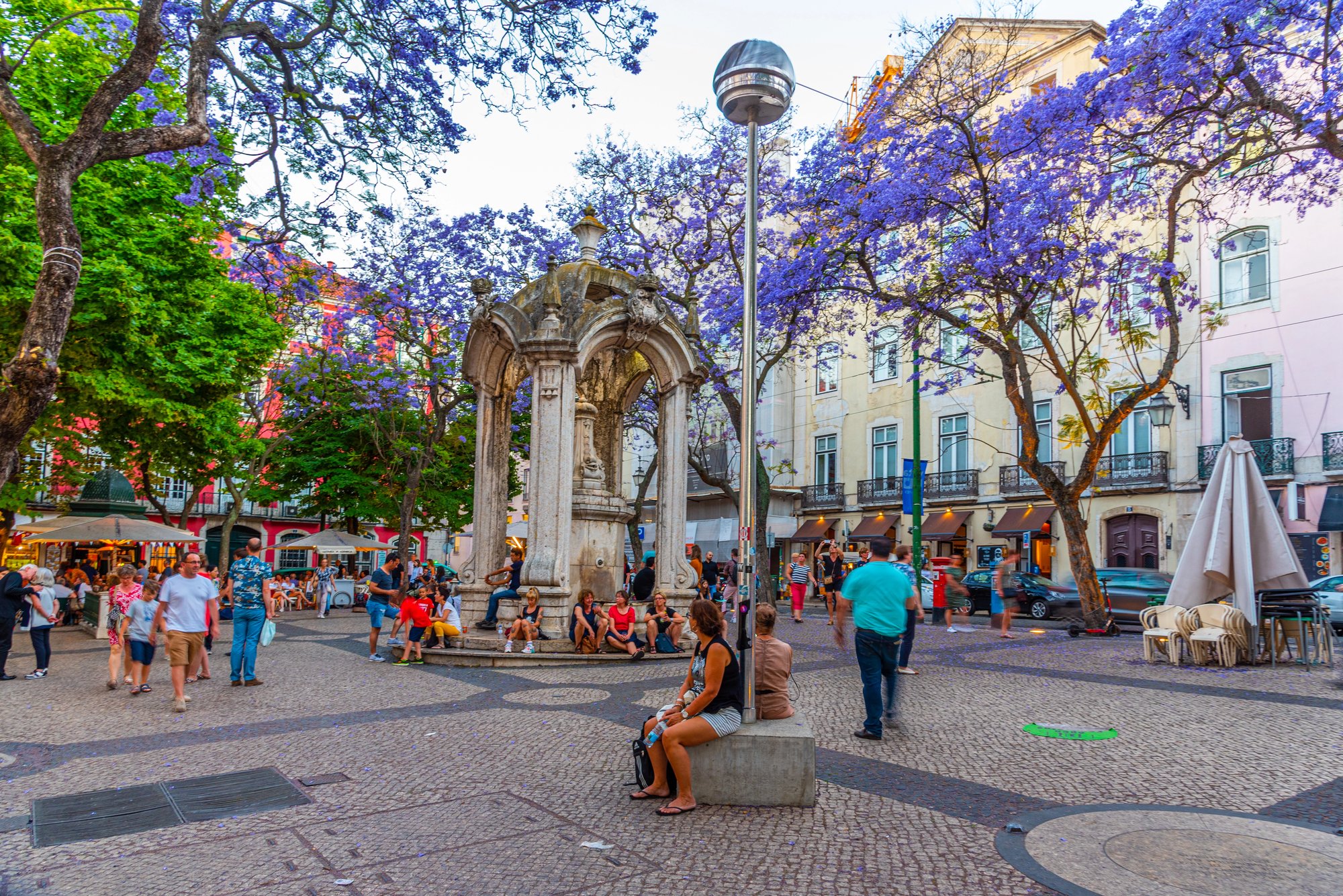
The Salazar Era and Urban Expansion
The planting of jacarandas continued and expanded during the Estado Novo period (1933-1974) under António de Oliveira Salazar’s regime. Despite the political repression of this era, beautifying the cities remained a priority, especially in preparation for the 1940 Portuguese World Exhibition (Exposição do Mundo Português), which celebrated the 800th anniversary of Portugal’s founding and the 300th anniversary of its restoration of independence from Spain.
This period saw further urban development with jacarandas being planted along newly constructed avenues and in parks throughout the city. The trees became an integral element of Lisbon’s evolving urban aesthetic, contributing to its distinctive character that blended traditional Portuguese architecture with natural beauty.
Post-Revolution Preservation and Expansion
Following the Carnation Revolution of 1974, which ended the Estado Novo regime, Lisbon underwent another period of urban renewal. Environmental awareness and the preservation of urban green spaces gained greater importance in city planning. Existing jacaranda trees were protected, and new plantings continued to extend their presence across the city.
In recent decades, environmental challenges such as climate change have raised concerns about the future of Lisbon’s jacarandas. However, the city’s commitment to maintaining its arboreal heritage has remained strong despite recent setbacks due to plans for new developments. Efforts to protect mature specimens and plant new trees ensure that the tradition of jacarandas in Lisbon continues for future generations to enjoy.
Jacaranda Blooming Season in Lisbon
Timing the Purple Wave
The jacaranda’s blooming season in Lisbon typically begins in mid-May and extends through June, with the peak usually occurring in late May to early June. This timing coincides with the end of spring and the beginning of summer, when temperatures in Lisbon become consistently warm.
The exact timing can vary slightly from year to year depending on weather conditions. Particularly warm springs may trigger earlier blooming, while cooler temperatures might delay the display. Climate change has also been observed to affect blooming patterns, with some years seeing flowers appear as early as late April.
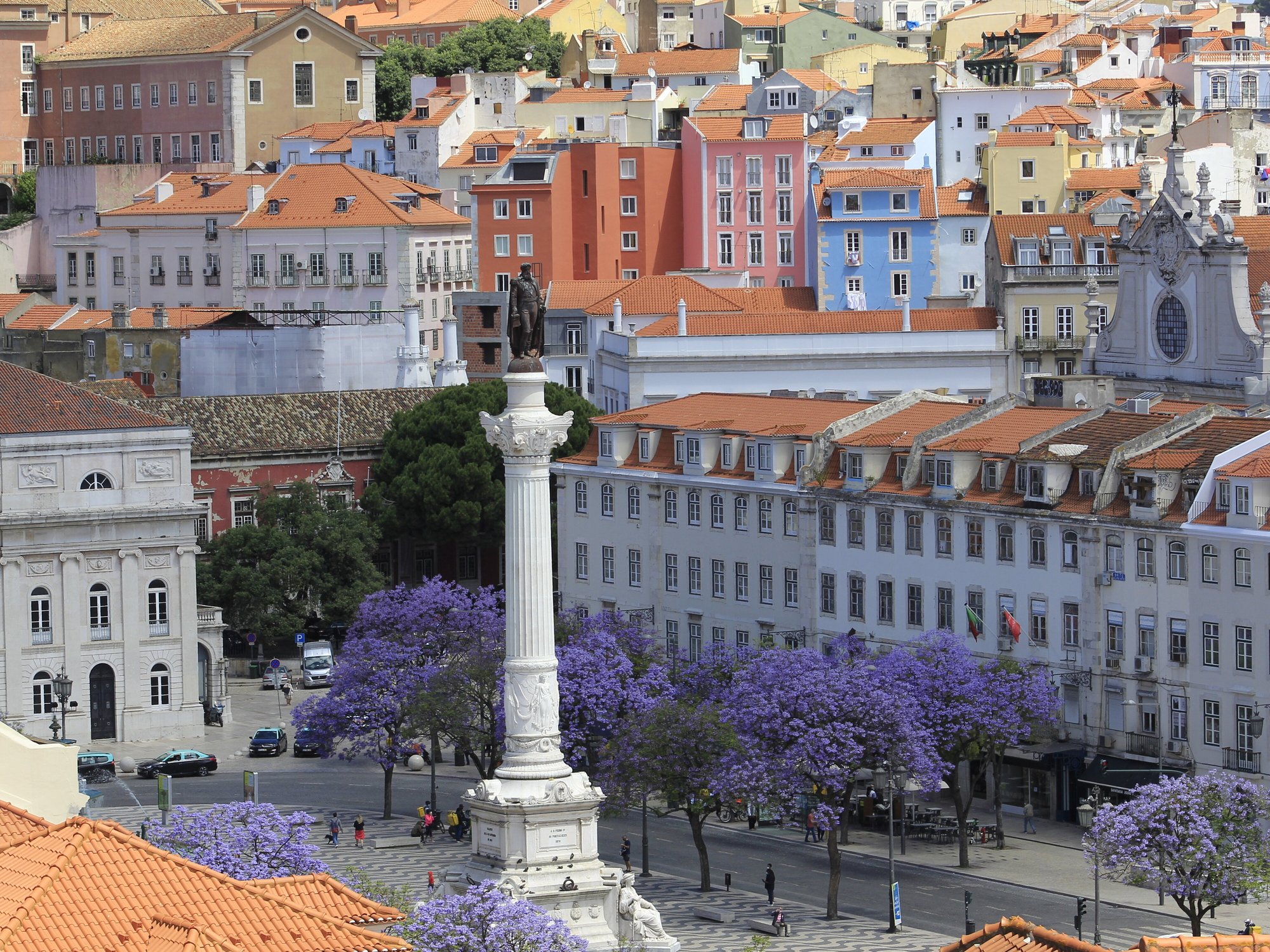
Duration of the Blooms
When jacarandas bloom in Lisbon, the gorgeous spectacle is as brief as it is breathtaking. The flowering period typically lasts about four to six weeks, with individual trees often showing their best color for just two to three weeks. This ephemeral nature of the bloom adds to its special appeal and creates a sense of urgency to witness the purple transformation before it fades.
As the blooming period concludes in late June, the delicate purple rain begins as the petals fall to the ground, which creates purple “carpets” beneath the trees. This second phase of the blossoming season is equally magical, as it transforms Lisbon’s streets and squares into purple-dappled wonderlands.
Cultural Significance of Blooming Season
For university students in Lisbon, particularly those at the University of Lisbon, the blooming of the jacarandas has traditionally signaled the approach of final exams. There’s a popular saying that if you haven’t started studying by the time the jacarandas bloom, you’re already too late. This association has embedded the jacaranda season into the cultural rhythm of the academic year.
For the broader Lisbon populace, the jacaranda blooming marks the beginning of the festival season. June is known for the Popular Saints’ festivals (Santos Populares), with Santo António being celebrated on June 12-13. The purple jacaranda canopies provide a fitting backdrop to these cultural celebrations and creates a festive atmosphere throughout the city.
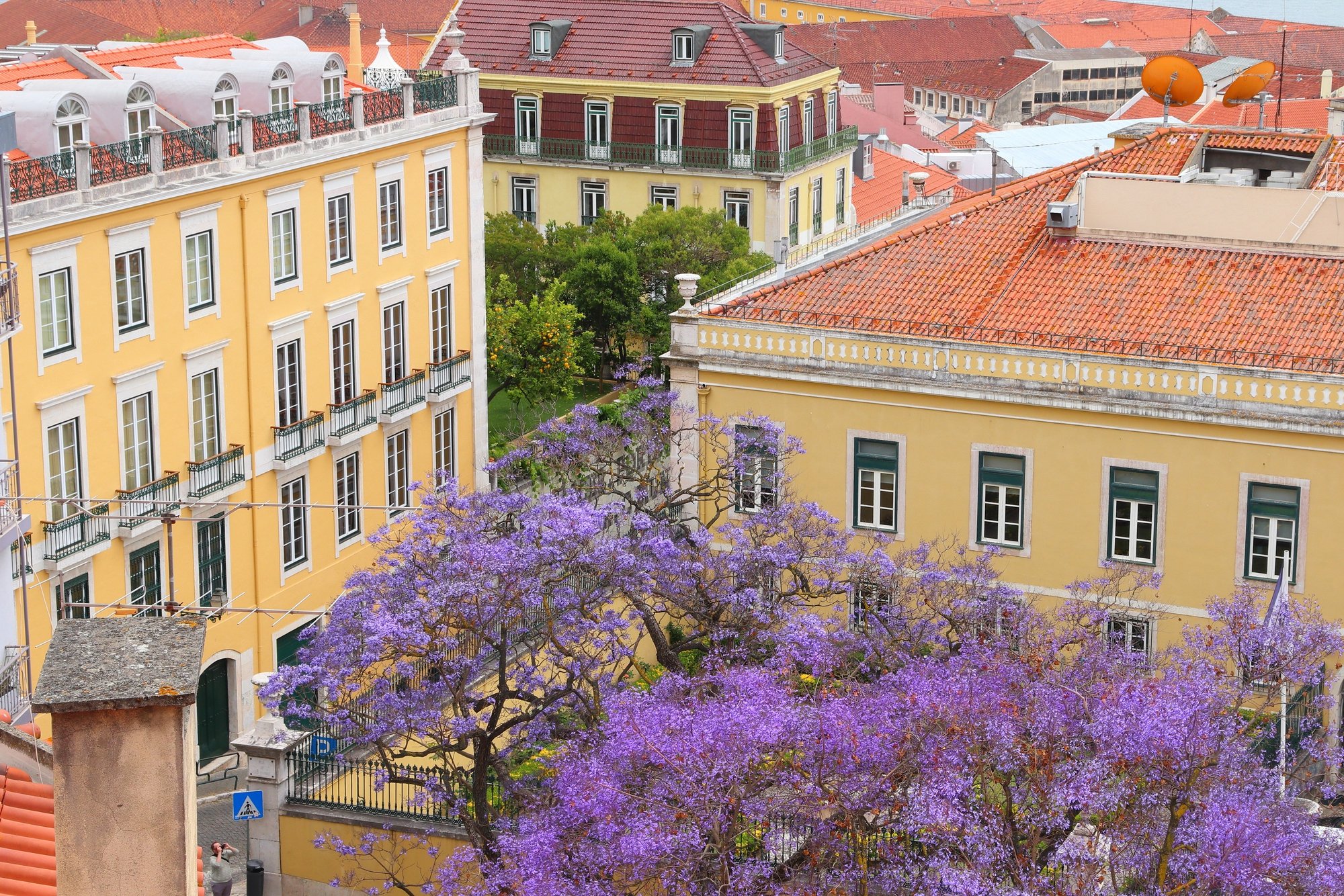
Best Locations to See Jacarandas in Lisbon
Avenida da Liberdade
Perhaps the most famous jacaranda display in Lisbon can be found along the elegant Avenida da Liberdade. This broad, tree-lined boulevard stretches from Restauradores Square to Marquês de Pombal Square and features rows of jacarandas on both sides. When in bloom, they create a purple tunnel effect that transforms this busy thoroughfare into a magical promenade. The contrast between the purple blossoms and the traditional Portuguese mosaic sidewalks (calçada portuguesa) makes for stunning photographs and memorable walks.
Príncipe Real Garden
The picturesque Príncipe Real Garden (Jardim do Príncipe Real) is home to several magnificent jacaranda specimens. This charming garden, centered around a large cedar tree, provides a breathtaking setting to appreciate the jacarandas against the backdrop of colorful 19th-century mansions. The garden’s elevated position also provides beautiful views over the city, with purple accents visible across Lisbon’s skyline during the blooming season.
Largo do Carmo
The historic Largo do Carmo square, adjacent to the ruins of the Carmo Convent, features several mature jacaranda trees that create a purple canopy over this historically significant space. The contrast between the ancient stonework of the Gothic ruins and the radiant purple flowers makes this spot particularly photogenic. The square’s central location in the Chiado district makes it an easily accessible spot to appreciate the jacarandas while exploring the city center.
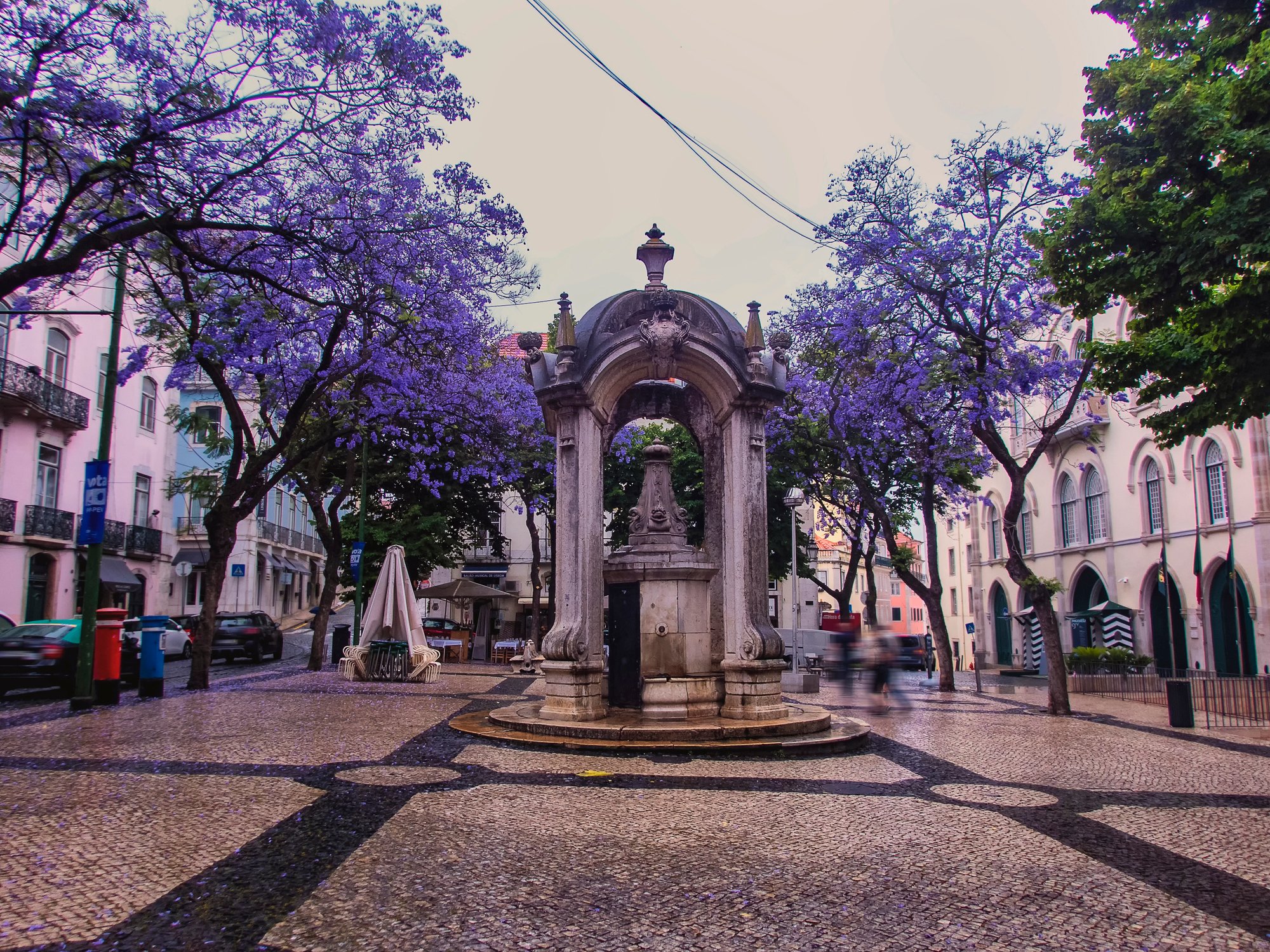
Campo de Santana
This lesser-known garden near Martim Moniz is a hidden gem for jacaranda enthusiasts. Campo de Santana (also known as Jardim Braancamp Freire) features numerous jacaranda trees in a romantic, English-style garden complete with winding paths and a small lake. The garden’s peaceful atmosphere offers a respite from the busy city and a perfect setting to appreciate the jacarandas without crowds.
Estrela Garden
The Jardim da Estrela, opposite the magnificent Basílica da Estrela, is another excellent location to see jacarandas in bloom. This 19th-century garden features several impressive specimens with their purple flowers creating beautiful reflections in the garden’s ponds. The mix of jacarandas with other exotic trees and plants makes this garden a botanical delight year-round, but particularly special during jacaranda season.
Praça do Império
Located in Belém, the Praça do Império features symmetrical gardens adorned with jacaranda trees. The setting is particularly grand, with the Jerónimos Monastery providing a historical backdrop to the purple display. The nearby Jardim Vasco da Gama also features several jacarandas, making the Belém area a worthwhile destination during blooming season.
Eduardo VII Park
This central park, ascending from Marquês de Pombal Square, incorporates jacarandas among its various types of vegetation. The park’s sloped design gives vistors elevated viewpoints where visitors can appreciate not only the park’s own jacarandas but also those dotting the city beyond. The geometric layout of the park provides interesting visual contrasts with the organic form of the blooming jacarandas.
Calouste Gulbenkian Foundation Gardens
The lush gardens surrounding the Gulbenkian Museum feature thoughtfully placed jacaranda trees among their diverse botanical collection. The modernist landscape design creates interesting juxtapositions between the architectural elements of the foundation buildings and the natural beauty of the jacarandas. These gardens offer a more contemporary setting to enjoy the trees compared to Lisbon’s historic squares and avenues.
Conservation and Future of Lisbon’s Jacarandas
Current Challenges
Despite their beauty and cultural significance, Lisbon’s jacarandas face several challenges. Urban development pressure, aging tree populations, and climate change all pose threats to the city’s purple heritage. Some of the oldest specimens have reached the end of their natural lifespan, which typically ranges from 50 to 100 years.
Climate change presents particular concerns, as changes in temperature and rainfall patterns may affect blooming cycles and tree health. Increasingly frequent heatwaves and drought conditions in Portugal can stress these trees, though jacarandas are relatively drought-tolerant once established.
Conservation Efforts
The Lisbon City Council (Câmara Municipal de Lisboa) has implemented various programs to protect and expand the city’s jacaranda population. These include regular monitoring of tree health, treatment for diseases and pests, and careful pruning to maintain tree structure without compromising flowering potential.
A systematic replacement program ensures that as older trees decline, new jacarandas are planted to take their place. The city has also expanded jacaranda plantings to newer neighborhoods, extending this botanical tradition beyond the historic center.
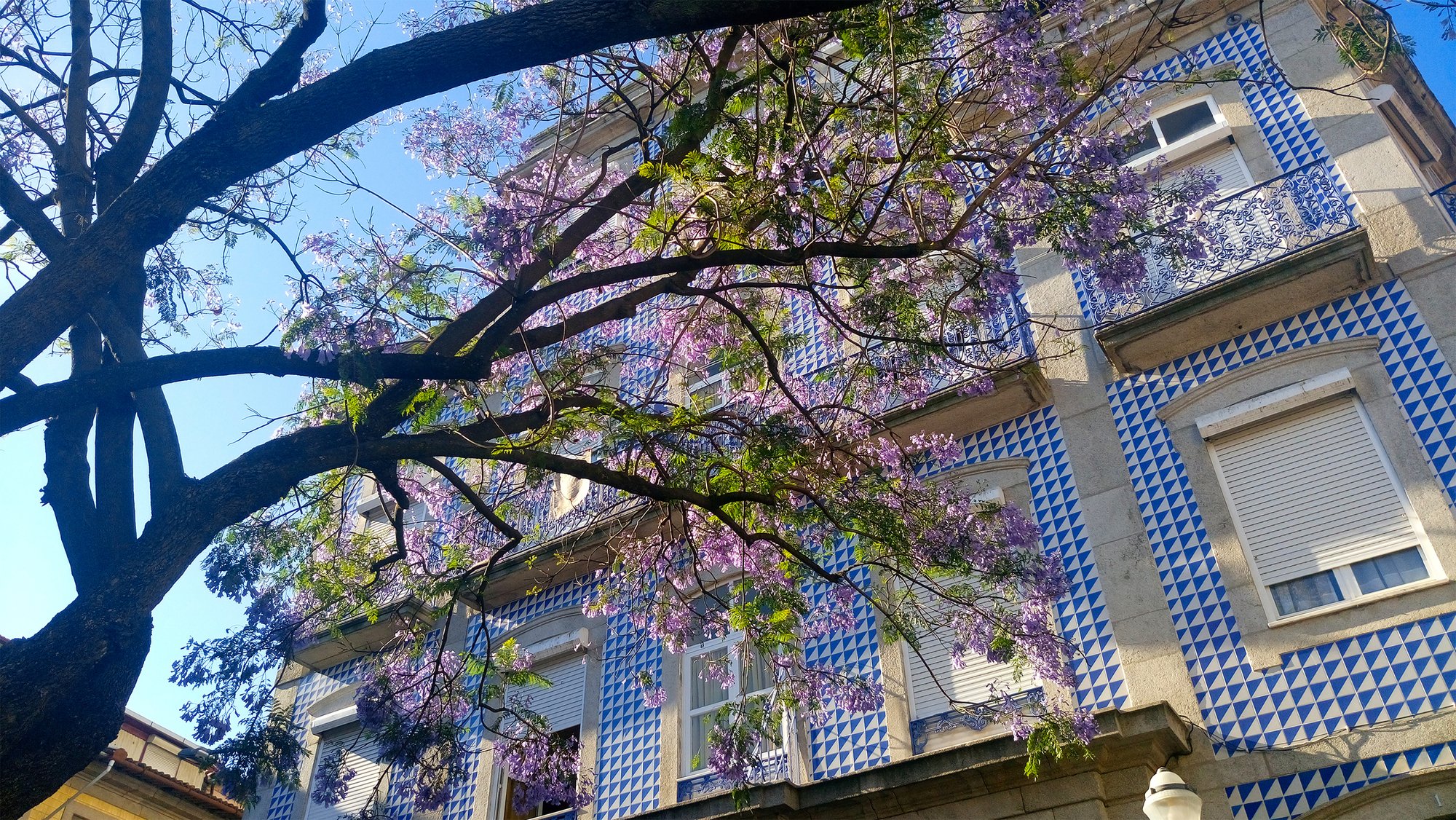
Sustainable Tourism
The growing popularity of Lisbon’s jacarandas as a tourist attraction has led to initiatives promoting sustainable enjoyment of this natural spectacle. Guided “jacaranda walks” educate visitors about the trees’ history and ecological value while directing foot traffic in ways that minimize the compaction of the soil around tree roots.
Local businesses have embraced the jacaranda season, with cafés and restaurants offering purple-themed menus and specialty items during blooming time. This commercialization, when done respectfully, can help raise awareness about the importance of preserving these precious trees.
Conclusion
Jacaranda trees have woven themselves into the very fabric of Lisbon’s identity. Their annual blooming creates a fleeting but unforgettable display that marks the transition from spring to summer.
As climate change and urban development present new challenges, the continued presence of jacarandas in Lisbon will depend on thoughtful conservation efforts and public appreciation. For now, these magnificent trees continue to enchant residents and tourists, painting the city in shades of purple every late spring and reminding us of the beauty of the natural world.







